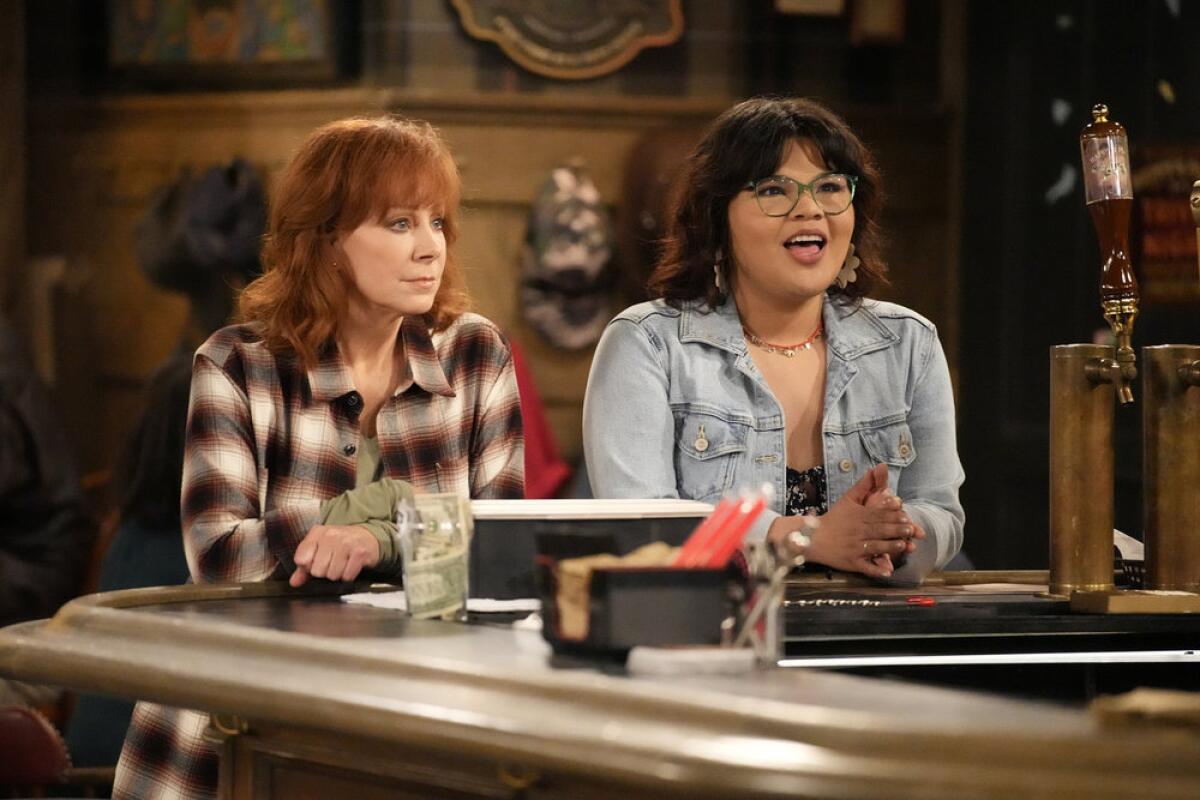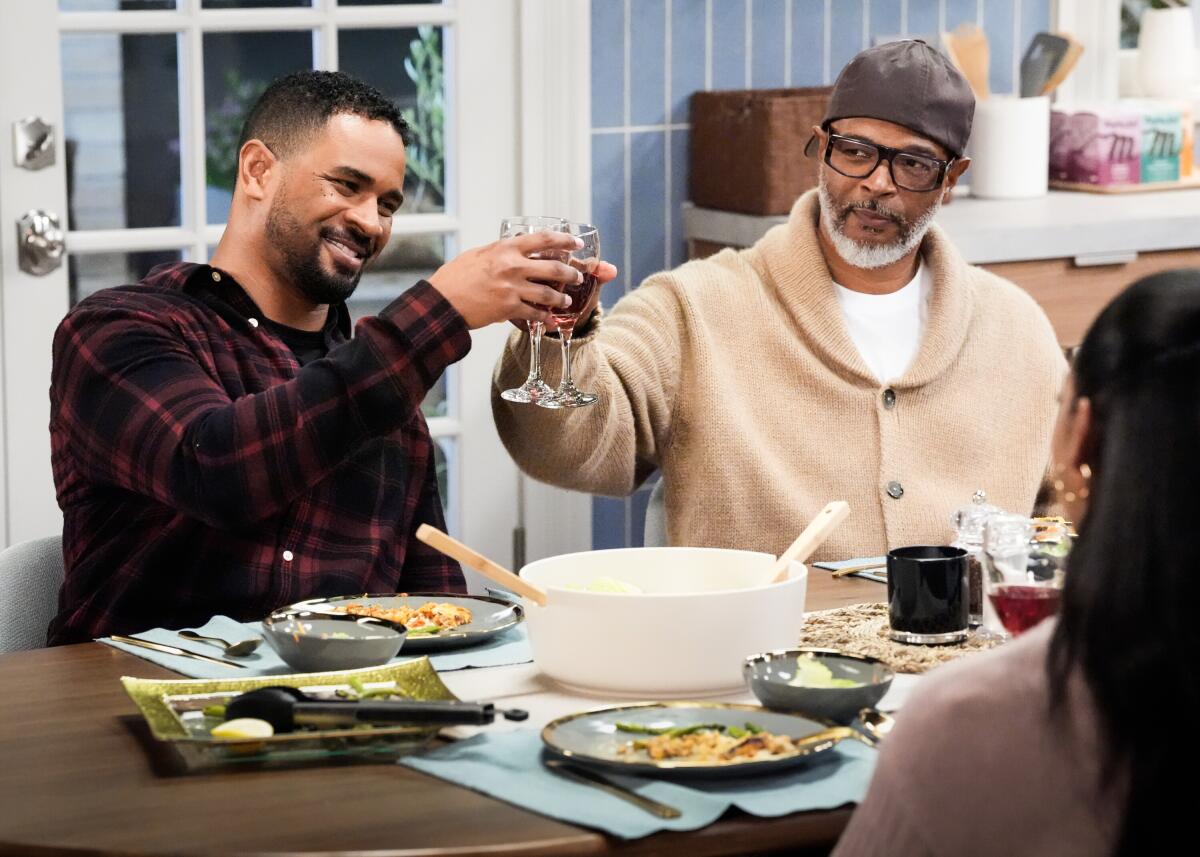If there is one form that immediately screams “television,” it’s the multi-camera situation comedy — filmed, taped or digitally recorded before a live audience, or at least giving the impression that it was. It has gone in and out of fashion over the years, vying with single-camera comedies — first with laugh tracks, now without — but continues to thrive, in all its anti-cinematic, brightly lit, deep-focus, three-walled, theatrical, long-take glory.
Multi-camera sitcoms break down broadly into family comedies, workplace comedies — which are also essentially family comedies — and comedies that alternate between home and work; their shared subject is how people live together. For comic purposes, characters will not get along, but week to week (most) everyone survives to another episode. And so there’s an intrinsic optimism to the form; a depressing multi-camera sitcom is a contradiction in terms, “Seinfeld” notwithstanding.
At the same time, it’s an accommodating form, a democratic form, that adapts to all sorts of settings and players, regardless of race, creed, color, class, age, sex, gender, period, or what have you. Sometimes there is drama, and often there is sentiment, and even, at judiciously spaced intervals, a little bit of heartbreak. There will be tonal differences, with series leaning more or less fantastic or realistic. But the main brief is to construct a friendly if chaotic place to visit weekly, with a grab bag of characters in whose lives you might invest — a place where you know everybody’s name and nod in recognition even as you laugh in surprise.
Network television is where the form almost entirely lives, with three new broadcast sitcoms appearing in short order this week and next. “Georgie & Mandy’s First Marriage,” arriving Thursday on CBS, is the latest entry in what might be called the Sheldon Cooper Television Universe; NBC’s “Happy’s Place,” which debuts Friday, puts Reba McEntire in charge of a bar; and “Poppa’s House,” premiering Monday on CBS, pairs father and son Damon Wayans and Damon Wayans Jr. as … father and son.
Critically speaking, I haven’t a bad word to say about any of them. They do the job they set out to do; each offers a number of satisfying, sometimes very satisfying, performances from actors who gives their characters individual life and more than enough jokes that work. The worst they can be accused of, apart from some characters being as annoying as they’re meant to be, is that they borrow from the deep well of sitcoms that have preceded them — indeed, they share some elements among them. But originality isn’t the point; far from it.
In “Georgie & Mandy’s First Marriage,” Rachel Bay Jones, center, plays Audrey, Mandy’s mother, and Will Sasso, far right, plays her father, Jim.
(Troy Harvey / Warner Bros. Entertainment Inc.)
“Georgie & Mandy’s First Marriage” is unusual, if not unique, in being a multi-camera comedy spun off from a single-camera dramedy spun off from a multi-camera comedy. A sequel to “Young Sheldon,” which was a prequel to “The Big Bang Theory,” the new series gets underway winking at the changing formats, as Georgie (Montana Jordan), his mother-in-law Audrey (Rachel Bay Jones) and father-in-law Jim (Will Sasso, a master of the low-key response) watch an episode of “Frasier.” (We are in the mid-1990s, though floating in endless sitcom time.)
“‘Frasier’s’ a laughing show,” says Georgie, meaning the laugh track. “I like laughing shows. … ‘Wonder Years,’ no one’s laughing. Is it funny? We’ll never know.”
As the title indicates, the series focuses on Sheldon Cooper’s older, less smart brother Georgie, his wife, Mandy (Emily Osment), and their respective families — mostly hers, as the couple lives with them and Georgie works for Jim at his garage, though Annie Potts as Georgie’s grandmother Connie, Zoe Perry as his mother, Mary, and Raegan Revord as his sullen sister, Missy, make appearances. (The precocious Sheldon, played older by Jim Parsons and younger by Iain Armitage, has decamped to Caltech in Pasadena, where apparently you can’t find Batman Underoos.)
The series follows hard upon the “Young Sheldon” story arc in which Georgie meets Mandy, both lie about their ages (he adding four to his 17, she knocking five off her 29), have sex, have a baby and get married. That their marriage is destined not to last is “Big Bang Theory” canon; just how long it will last, or why it might end, who knows. Looking for clues in “The Big Bang Theory” is pointless; apart from an interest in tires, prequel Georgie, who is sweet and optimistic, if a little immature, seems to have little to do with his brash, resentful older self, played by Jerry O’Connell in “Big Bang” guest shots.
Still, co-creator Chuck Lorre has a taste for sharp edges — the generational alcoholism in “Mom,” the women behaving badly of “Cybill” — and the seeds of dissent are planted early. Mandy, formerly a weather girl with a degree in communications, is looking for a job as a TV reporter (“Look at this face — I’m on-camera talent”) and considering searching farther afield than the small east Texas town Georgie regards as home. Georgie has a panic attack he prefers to regard as a heart attack. (“Anxiety — that’s just some New York nonsense.)

In NBC’s “Happy’s Place,” Reba McEntire stars as Bobbie, left, who inherits her father’s bar along with her sister Isabella (Belissa Escobedo).
(NBC/Casey Durkin/NBC)
In “Happy’s Place,” country music legend McEntire, in her third starring sitcom (she also had a recurring role on “Young Sheldon”), plays Bobbie, running the tavern her recently deceased father left her. In terms of stagecraft, we’re back in “Cheers,” bar in the middle, entry at left, office at right — classic. Even shows not strictly set in bars have found it convenient to have their characters hang out in one. The staff includes bartender Gabby (Melissa Peterman), desperate to be Bobbie’s best friend; Steve (Pablo Castelblanco), a germaphobe accountant; Takoda (Tokala Black Elk), a waiter cum handyman, the Woody of the group; and Emmett (Rex Linn, wonderfully modulated), a bearish cook and voice of truth, who plays opera to keep people out of his kitchen.
Into this mostly settled environment comes Isabella (Belissa Escobedo), Bobbie’s unsuspected, unsuspecting half sister, to whom their father, previously unknown to Isabella, has willed half the bar. Generational humor ensues — McEntire is 69 to Escobedo’s 26, though Bobbie reads as significantly younger — including jokes, tired yet seemingly irresistible, in which older people attempt to talk like younger people.
Isabella, who “majored in psychology,” wastes no time in letting her opinions be known — I mean, I’d hang back a little, get the lay of the land, instead of thinking my suggestions, based on a day’s experience, needed to be taken seriously. (The series doesn’t disagree. Emmett: “First stop saying you’re entitled to anything, ‘cause it’s a whiny word that makes my butt clench.” Isabella: “But I kind of am.” Emmett: “That, right there — don’t do that.”) This tug-of-war is the main business of the opening episodes, playing off Bobbie’s defensive annoyance and Isabella’s feeling left out, unseen and unloved. But they’ll be friendly before long and living together by the end of the second episode, amplifying the situation in the situation comedy.
Like “Georgie & Mandy,” “Poppa’s House” involves parents, children, marriage and in-laws. Damon (Wayans Jr.) has dreams of being a director, but for the moment he’s working (like Georgie) for his father-in-law, “the foam roller king.” He’s been offered a managerial position that promises to take him further from that goal but will satisfy his wife’s (Tetona Jackson) desire to send their kids to private school. The younger people live on the largess of their respective wealthy parents.

Damon Wayans Jr., left, and Damon Wayans Sr. star in CBS’ “Poppa’s House.”
(Robert Voets / CBS)
Damon’s father, the eponymous Poppa (Wayans Sr.), who lives next door for drop-in visiting, has his own workplace thread, sort of an upside-down version of “Frasier”: He’s a popular New York City radio personality who plays records, takes calls from listeners, and is perfectly happy in his life. But the station overlords have seen fit to saddle him with a co-host, a podcasting female psychologist Ivy (Essence Atkins), to balance his less than enlightened, but not quite misogynist, sexual remarks and bolster his female demographic.
They will spar, obviously — as in “Happy’s Place,” there are territorial issues. Ivy says his scruffy beard and “menopause cardigan” make him look like a “ghetto Papa Smurf.” He rates a podcaster below “movies, TV, recording artist, radio personality, mime and organ grinder monkey.”
She: “There you go again, another reflexively asinine comment.”
He: “First of all my ass ain’t a nine, it’s a 10.”
It’s like that.
To judge only by the pilot, “Poppa’s House” will be a lightweight show, the lightest of these three. There are repeating jokes about the size of Poppa’s head. But the Wayanses are having an evident good time working together, as underscored by the bloopers that run under the closing credits — and what more do you want from them, really?


